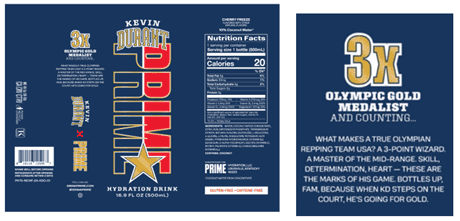December 2, 2024
On July 19, 2024, the United States Olympic & Paralympic Committee (“USOPC”) filed a complaint against performance sports beverage company Prime Hydration, LLC (“Prime Hydration” or “Prime”) in the United States District Court for the District of Colorado for allegedly violating the USOPC’s trademark rights via Prime Hydration’s Olympic-themed advertising campaign. 1
The marketing practice, known as “Ambush Marketing,” has been a widely used tactic for years by companies who are not official partners of the Olympic Games (“Olympics” or “Games”), lacking legal rights to its intellectual property (“IP”), that try to find strategic workarounds to alignment. More often than not, they find themselves in court instead of finding their signage on the field. See United States Olympic & Paralympic Committee v. Prime Hydration, LLC, Case No. 1:24-cv-02001-MDB. 2
The United States Olympic & Paralympic Committee is “responsible for the training and funding of U.S. teams for the Olympic, Paralympic, Youth Olympic, Pan American and Parapan American Games,” and heavily relies on its IP, including the licensing of its trademarks, for funding of the U.S. Olympic Team. 3 Because of the global attractiveness of the Olympics, it is one of the most sought after marketing events for affiliates. However, being an official sponsor comes at a steep price. The alternative? Ambush marketing—and its potential backlash.
In United States Olympic & Paralympic Committee v. Prime Hydration, Prime Hydration, a company co-founded by YouTube and social media personality Logan Paul, launched a marketing campaign in the lead-up to the 2024 Paris Olympics featuring Team USA Basketball star Kevin Durant. 4 Shortly after the campaign launched, the USOPC filed a lawsuit alleging that Prime’s use of Olympic trademarks and related terminology, including “Olympic,” “Team USA,” and “Going for Gold,” will confuse consumers into thinking that the committee endorsed the brand. 5 In its complaint, the USOPC lists Coca-Cola as the sole company with rights to use its trademark on beverages. 6 USOPC demanded Prime stop using its marks and requested monetary damages. 7 Depicted below is the allegedly infringing label:
 8
8
Prime Hydration moved to dismiss for failure to state a claim on November 7th, striking back at the USOPC, accusing it of a “shotgun pleading” approach that lacked support for its claims. 9 The “‘USOPC knows that its allegations are tenuous, which explains why it adopts its current ‘kitchen sink’ approach by filing the complaint with disjointed factual statements and mere legal conclusions for its causes of action.’” 10
The USOPC has 21 days to file an answer to Prime Hydration’s Motion. 11
Official partnership of the Olympic Games is a limited and highly coveted marketing relationship. As a result, “those who are not official sponsors may attempt to ‘piggy-back’ on the event in clever ways,” which is known as ambush marketing. 12 There are two main types: (1) Ambush by Association, and (2) Ambush by Intrusion. 13 Ambush by Association often involves the improper use of trademarks or IP rights associated with the event, i.e. Prime Hydration, whereas Ambush by Intrusion is related to actions taken to gain exposure on television and screens, such as giving away free products on-site. 14 For example, during the 2012 London Olympics, Beats by Dre gifted its headphones to numerous athletes, despite not being an official sponsor, resulting in many Olympians wearing its products during the duration of the Games. 15
This conduct is often met with legal repercussions via protections offered by the IOC and the federal government.
The International Olympic Committee (“IOC”) delegates authority to enforce its intellectual property to national Olympic committees, such as the USOPC. 16
The USOPC enjoys statutory protection via the Ted Stevens Olympic and Amateur Sports Act, 36 U.S.C. § 220506. 17 The Act grants the USOPC exclusive rights to commercially exploit its IP related to the Games. 18 As a result, the Act also authorizes the USOPC “to file a civil action against unauthorized use ‘for the purpose of trade, to induce the sale of any goods or services, or to promote any theatrical exhibition, athletic performance, or competition…[of] any trademark, trade name, sign, symbol, or insignia falsely representing association with, or authorization by” the USOPC or its affiliates.’”19
The USOPC has not, and will continue to not, hesitate prosecuting alleged infringers. As the United States plans to host not one, but two behemoth sporting events in the upcoming years, namely the 2026 FIFA World Cup and 2028 Los Angeles Olympic Games, clients should be mindful of their marketing strategies. How close is too close? Is the risk worth it?
The USOPC is afforded great legal protection as it relates to the Olympics and protecting its IP. If a company strives to align with the games without being an official sponsor, proceed with caution. Partnering with Olympic athletes poses potential problems, however enlisting an Olympian could help a company achieve its desired goal without spending the big bucks. If the company decides to proceed in this manner, be sure to refrain from using Olympic branding.
The USOPC takes enforcement seriously – the only sure way to avoid any issues? Become an official sponsor.
777 South Flagler Drive
Phillips Point East Tower, Suite 1000
West Palm Beach, FL 33401